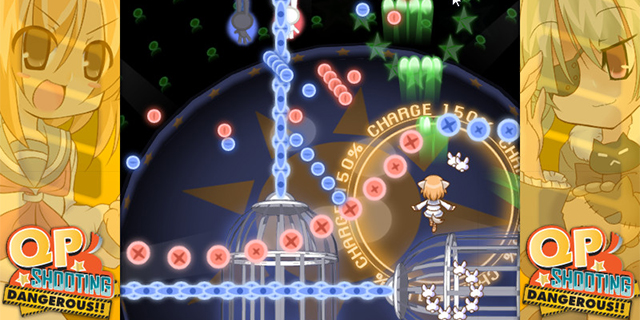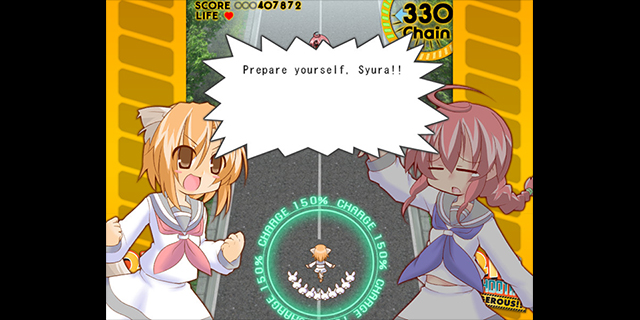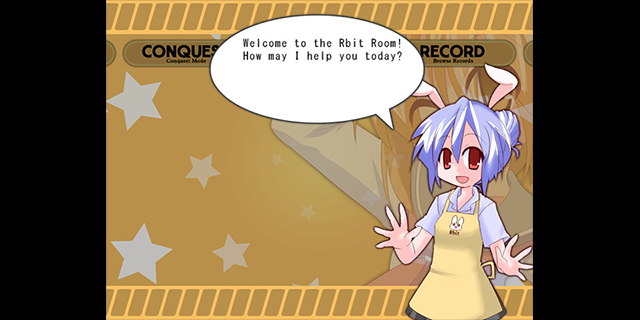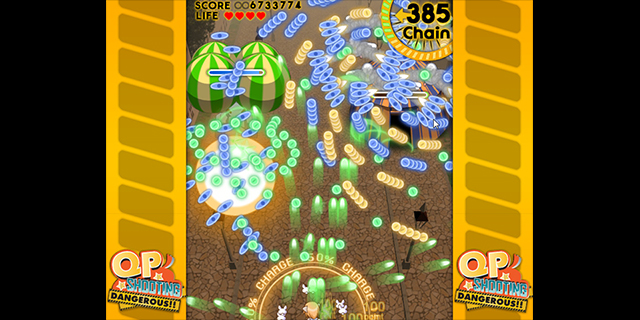
Rumors of the death of the shoot-’em-up has been greatly exaggerated. In the aftermath of the Japan-exclusive gold rush of shooters for the Xbox 360, we are starting to see the market stabilize a bit more as independent developers are finding success in the PC market outside of Japan. Leading the charge of localizing doujin games is Fruitbat Factory. Its latest release stars a character that may be familiar to players of 100% Orange Juice, the party game released last year, but the shoot-’em-up gameplay won’t be so similar. We’re going to take a look at how well QP Shooting: Dangerous!! holds up as a shooter compared to its contemporaries.
The game is a vertically-scrolling “bullet hell” shoot-’em-up, much in line with many of the other games of this type. Why? There’s something to be said about reaction times, attentive visible areas and hitboxes for vertical shooters as opposed to horizontal ones, but in short, there is a good reason for a bullet-hell game to be vertical, and it makes sense to see the trend followed. The game uses a weapon system similar to Radiant Silvergun, in that players does not collect different weapons over time; instead, they can switch between different shot concentrations and angles from the outset. These games are far more difficult than an average shooter, and pairing the level of on-screen threats at any given time with the punishment systems of something like Gradius would make the game far less engaging, as the loss of weapons and progress after a single hit would make rapid iteration of new ideas far more difficult and time-consuming.

QP Shooting never allows players to lose access to a weapon, allowing them an easier time with rapid iteration of strategies. If you change the available mechanics, even in the same play space, a player is less likely to have learn the game’s lessons or see if their hypothesis can be proven true. I admire the fact that QP Shooting understands this. While there is something to be said for having a greater variety of different weapon types as rewards for a player, I believe that, in a game where execution is not only the core engagement but the sole one, having this player feedback cycle be as short and painless as possible is far more desirable.
Because the player always has access to all three shot patterns, the game designers were able to use this to make dispatching enemy waves more based on switching to the proper shot pattern than expertly surviving an onslaught of bullets, occasionally landing a shot. While the latter is still certainly a large part of the game, this prefaces each encounter with a short recognition puzzle before the execution challenge starts in earnest. Encouraging the player to really think about which of their options would be the most effective is the perfect way to implement such a system, and shows a great level of competency in the designers with regard to enemy placement.
Hitbox sizes have always been a topic of great debate in shoot-’em-ups, and QP Shooting offers a fair solution to the issue by allowing the player to see a visual overlay showing them. This is a little touch that really helps visualize how a player can safely weave through waves of bullets. Another useful addition comes from the ability to change your overall shot’s damage in contrast to “super mode” length. This allows you to essentially bet your own skill against the difficulty of the game, adding another layer of depth to difficulty selection, in addition to the four levels of difficulty explicitly offered.

In conquest mode, the player may save after each stage to continue their progress at any point. This is a godsend of a feature, and it is nice to see that modern shoot-’em-ups are starting to distance themselves from the notion that such a game needs to send you back to the beginning to offer longevity and challenge. Such a progress system makes sense for arcades, where the only mode of monetization is getting the player to play the same content as long as possible. For home games, this is not as necessary, and a game should have this sort of option. There’s one big blemish on the game’s options, though. This game was very clearly designed for play with a controller, and certain options such as text input or menu navigation are only usable with arrow keys.
Anyone who has given more than a passing glance to the doujin scene knows full well what to expect aesthetically: anime-inspired character designs with a bright, soft color palette. There are elaborate character portraits, and simple (but dynamically animated) gameplay sprites. QP Shooting does have polygonal backgrounds, which serves as a nice visual contrast against the bright sprites and the even-brighter bullets. This creates a three-plane effect of visual layering that lets a player easily differentiate object importance. The game’s audio is nothing terribly special; songs are lighthearted and charming, but not terribly melodic or memorable. The same goes for sound effects, which prove to be serviceable and stock for the genre. It is a refreshing change of pace, considering the bulk of scrolling shooter soundtracks are heavily techno-filled or metal-inspired, but considering QP’s inspirations, it isn’t too big of a novelty.

There was one portion of the game that was quite troubling. The dialogue in the introduction to the second stage boss showed a shocking and confusing degree of transphobia that had absolutely no precedent in the story before or after. It existed as the only topic for that conversation, and was quite disgusting to see, especially since it just came out of nowhere. This exists as a highly disappointing blemish on an otherwise well-crafted game, and shows how callous and unthoughtful decisions can mar an experience.
If you want to see how weapon selection affects level design in shoot-’em-ups, were a big fan of the weapon system in Radiant Silvergun or simply want to support more doujin teams like Orange Juice, then I recommend picking up QP Shooting. It’s delightful to see Japan’s indie scene start to make it over to the West, and games that would be otherwise unavailable to us actually making a mark here is a great trend. QP is an engaging, well-crafted little shooter, and one that fans of the genre should check out.
Pros: Clever weapons system, thoughtfully-designed levels, save feature
Cons: Uninspired music, poor keyboard support



















